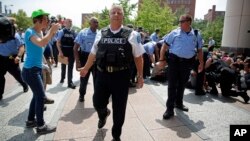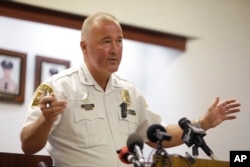Officials in the central U.S. state of Missouri declared a state of emergency Monday, in the embattled city of Ferguson, hours after violence erupted on the first anniversary of the shooting death of an unarmed black teenager by a white police officer.
St. Louis County Executive Steve Stenger declared the emergency after prosecutors filed 10 charges against an 18-year-old suspect accused of shooting at an unmarked police car late Sunday before four officers returned fire and critically wounded him.
"The recent acts of violence will not be tolerated in a community that has worked so tirelessly over the last year to rebuild and become stronger," Stenger said.
His state of emergency will allow county Police Chief Jon Belmar to take control of law enforcement in and near Ferguson, although it was not immediately clear what steps police might take to preserve order.
While Ferguson swept up after Sunday’s violence, about 50 people were arrested Monday in front of the courthouse in the nearby city of St. Louis.
At least 150 people had marched peacefully several kilometers from a St. Louis church, demanding federal action to stop unfair policing. They were arrested when they blocked the courthouse’s entrance.
Famous author and academic Cornel West was among those arrested
Belmar said detectives had been tracking a man they feared was armed and he was then involved in an exchange of 40 or 50 shots between two groups of people, before shooting the officers' vehicle.
"They were criminals, they were not protesters," Belmar said of the groups that exchanged shots. "Protesters are people that are out there that are talking about a way to effect change, whatever that may be. That is not what is happening here."
Lynch condemns violence
U.S. Attorney General Loretta Lynch condemned the overnight violence in prepared remarks to the Fraternal Order of Police, Reuters reported.
"As we have seen over the recent months and years," Lynch said, "not only does violence obscure any message of peaceful protest, it places the community, as well as the officers who seek to protect it, in harm's way."
Earlier Sunday, the situation was peaceful as marchers began at the site where Michael Brown, 18, was shot by Ferguson officer Darren Wilson on August 9, 2014, during a street confrontation. The demonstrations that followed Brown's killing threw the St. Louis suburb into the national spotlight and sparked calls for better treatment of minorities by police.
The alleged gunman hospitalized after this weekend’s shooting was identified by his father as Tyrone Harris Jr., 18, the St. Louis Post-Dispatch reported. The father said his son had been a "close" friend of Brown.
Belmar said at a news conference that the outbreak of violence in Ferguson was "an impediment to positive change." He said police first increased their presence after reports of looting. He also reported that an officer was injured by a flying brick Sunday night and that bottles were thrown and shattered near officers.
The police chief asked for help in identifying agitators who went beyond peaceful protests.
"There are a lot of emotions – I get it," the police chief said. "But this is something different and we cannot sustain this as a community as we move forward."
Belmar said he believed the violence was avoidable, and that too many people in Ferguson were working too hard for it to happen.
After the shooting, police ordered people still gathered in the area to leave and used smoke grenades to disperse the crowd.
Several participants criticized the police on Twitter, saying the smoke was fired after people were already complying.







